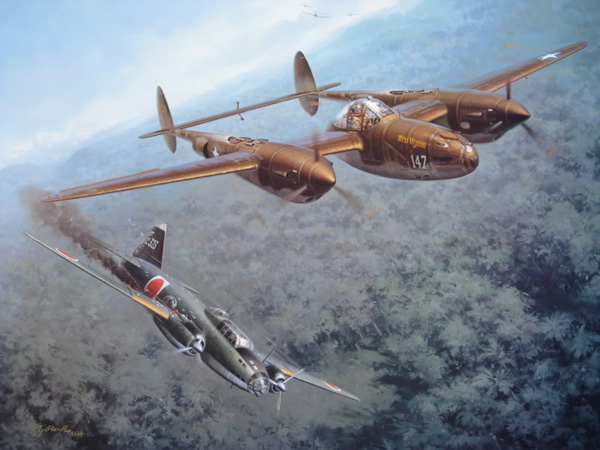
Bye Bye Iso
Posted on 04/17/2017 7:37:05 AM PDT by SpeedyInTexas
Enemies are enemies and Yamamoto was on the top of the list as the most dangerous. End of story.
I have some trouble with including civilians.

Sadly, he was the best hope for negotiating a peace rather than dragging out the war for a few more years. He had warned in advance that if a deal wasn’t struck within six months after Pearl Harbor, Japan would lose the war. He knew our industrial might would grind them down, and Japan had no chance of winning a war outright.
Yamamoto had absolutely no independent stamding or authority to pursue an early peace. Tojo and the army were totally in charge. Even in the summer of 1945, when the war effort was so obviously hopeless for Japan, the army was ready to assassinate any leader pushing for peace. It took the atomic bombs plus the Emperor.
Definitely possible, but even Tojo must have known by mid-42 that Japan had bitten off more than it could chew.
Exactly. I have studied this campaign and even wrote my monograph for a Master’s Degree on the Solomons/New Guinea campaign.
A dispassionate analysis of Japanese senior leaders would have revealed that Admiral Yamamoto would have worked hard to negotiate an end to a war he opposed.
However expecting dispassion in war is a fool’s errand. Clausewitz described the composition of war as three interacting parts: “...primordial violence, hatred, and enmity, which are to be regarded as a blind natural force; of the play of chance and probability within which the creative spirit is free to roam; and of its element of subordination, as an instrument of policy, which makes it subject to reason....”
Yamamoto was targeted for three reasons.
1. He was reachable, signal intercepts let us know he would be in range of US fighters (Chance/probability coming into play)
2. It was a rare opportunity to kill one of the ablest enemy commanders. (rational policy to harm the enemy war effort)
3. Revenge. Yamamoto embarrassed the Army and Navy, killing him (passion- hatred for the man who harmed and embarrassed you)
Even if Yamamoto had avoided or survived the attack (some people did survive the crash). It is likely that the extremists in the Army would have tried to kill him in ‘44-’45. The type of officers who wanted to fight on even after the two atomic strikes.
HE didn’t miscalculate, simply warned his government. I don’t think he ever believed victory was possible, and was hoping for a settlement instead.
Not an outlandish concept; Americans forget that while we were slogging our way across the Pacific, and supplying the USSR, Japan and the USSR had a peace treaty that lasted until late 1945.
If you ever get up that way, there’s one right inside the main entrance at the Bong museum in Superior, WI (across the harbor from Duluth, MN). Worthwhile.
http://bvhcenter.org/virtual-exhibits/
I don’t sympathize with Yamamoto, or even with the Japanese civilians melted by the atom bombs; I know what Japan did not just to our POWs but to millions of Asian civilians.
It is fact that he knew Japan had no hope of winning a prolonged war, and that negotiations were the only possible solution. I only wish the emperor he served would have been executed as well.
Absolutely. As I said above, it’s truly a great American military story. No tears at all for that POS, in fact, I would have like to have seen him slumped over in his seat. “Bowing” position, riddled with American bullets
BIH Yamamoto. Countless American heroes put the details together quickly and succeeded in putting you in your rightful place
He didn’t intend to negotiate anything (wasn’t his place/role); he was just stating the obvious.
Assassination is subjective. During a war, you are a target if you are in the military.
See # 52; he had no intention of negotiating anything. He simply knew Japan could never win a war against the US.
Very possible he’d have been offed anyway for his negative vibes, and he was a logical (and exposed) target.
-—— negative waves —— ;)
Actually, he taught the army pilots fuel management. That was mostly leaning out the mixture during cruise.
According to Saburo Sakai, the Japanese Zero ace who wrote the WWII autobiography Samurai, the Emperor gets a lot of credit stateside for the surrender, but was in fact a big part of the problem all along. Sakai describes a totalitarian Japan where the government was intent on victory right to the end, lying their butts off about their military failures to the suffering populace.
Sakai says he always respected his American adversaries and became very pro-American. After the war, his daughter married an American, and his grandchildren are American. He was a frequent participant in US-Japanese flyer reunions. Fantastic book.
I stand corrected. If tanks could float Oddball would have knocked off the emperor himself...
Disclaimer: Opinions posted on Free Republic are those of the individual posters and do not necessarily represent the opinion of Free Republic or its management. All materials posted herein are protected by copyright law and the exemption for fair use of copyrighted works.